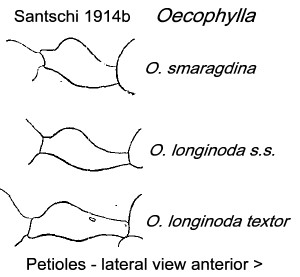Oecophylla textor Santschi - new status
 Type location Zanzibar or Kenya
(Oecophylla
smaragdina stirps longinoda Latr., var. textor
nov., Santschi, 1914b: 128) collectors Alluaud & Jeannel - see below. Type location Zanzibar or Kenya
(Oecophylla
smaragdina stirps longinoda Latr., var. textor
nov., Santschi, 1914b: 128) collectors Alluaud & Jeannel - see below.
Note - the type location is wrongly given as Zaïre by Bolton (1995),
presumably a misreading of Wheeler's catalogue list (1922: 947)  . .
|
 Santschi's (1914b) description of textor is at Santschi's (1914b) description of textor is at  . .
Also known from "British East Africa" - Kenya, locations
near Mombasa (Allaud & Jeannel).
Overall, Oecophylla textor appears to be more
closely related to Oecophylla
smaragdina than the West Africa/Congo Basin Oecophylla
longinoda. In full face view the head, clypeus, mandibles and
antennae are similar, but with smaragdina the head profile is
more bulbous, in full face view the occiput is near straight; the
propodeum is angular and the petiole both more slender and shallower
(see below).
Emery's (1892d) note, including remarks on the Esat
African form as nearer smaragdina,
is at  . .
|
 Weber (1946c) wrote of "Dimorphism in the African Oecophylla
worker" as if it was an unknown phenomenon - Weber (1946c) wrote of "Dimorphism in the African Oecophylla
worker" as if it was an unknown phenomenon -  .
The sole reference (apart from his own report on the ants of the
Imatong Mountains) was to the summary in Wheeler (1922). It seems that
Weber was unaware of the earlier work, e.g. Andre's (1890) description
of the minor worker, thinking it was a distinct species, Oecophylla
brevinodis, from among the major workers of "Oecophylla
smaragdina" from Sierra Leone .
The sole reference (apart from his own report on the ants of the
Imatong Mountains) was to the summary in Wheeler (1922). It seems that
Weber was unaware of the earlier work, e.g. Andre's (1890) description
of the minor worker, thinking it was a distinct species, Oecophylla
brevinodis, from among the major workers of "Oecophylla
smaragdina" from Sierra Leone  . .
Of particular interest, here, is that Weber studied
mainly specimens from his own collections in southern Sudan (now South
Sudan). He
described and illustrated the Sudan specimens and referred to others
sent to him from Tchole I and Mafia I, both off the coast of Tanzania,
"supposedly belonging to the variety textor". The overall shape
of
Weber's maxima specimens, specially the lateral alitrunk and petiole,
matches Santschi's textor and the specimens sent to me from
South Sudan (below). Weber also described the gaster as distinctly
paler ferruginous (than Wheeler's typical longinoda), adding
that after chloroforming the gaster became distinctly darker than the
rest of the body and became distinctly ringed. The shading in Way's
drawing and my photographs both show exactly that banding.
|
 The
species, as Oecophylla longinoda var. textor was
extensively studied in Zanzibar by M J Way, who followed the Wheeler
(1922) concept of there being five varieties of Oecophylla longinoda
(Way, 1955). He provided the drawings of the workers and (in his paper)
sexual forms. When the images are overlaid the major worker exactly
matches the Sudan specimen shown below. The
species, as Oecophylla longinoda var. textor was
extensively studied in Zanzibar by M J Way, who followed the Wheeler
(1922) concept of there being five varieties of Oecophylla longinoda
(Way, 1955). He provided the drawings of the workers and (in his paper)
sexual forms. When the images are overlaid the major worker exactly
matches the Sudan specimen shown below.
Menozzi & Consani (1952: 69) also had recorded Oecophylla
longinoda textor (citing Wheeler, 1922, as their authority), three
workers, from Meule in Ethiopia, collected by the Zavattari
Expedition of 1939.
|
 The photomontage of the
type major worker is collated
from http://www.antweb.org/specimenImages.do?code=casent0912350 The photomontage of the
type major worker is collated
from http://www.antweb.org/specimenImages.do?code=casent0912350
|
Oxford University Museum
specimens
Oecophylla textor
B Taylor det. |
South Sudan
A Omer
S 1-23
|
2005-6
Yambio
4.5705556 N
28.4163889 E
|
on a lianescent plant
Ebodjé, or Ebodie
70 m from village; flat terrain
|
2
|
 |
Oecophylla textor
B Taylor det. |
Ethiopia
Serge Guiraud
|
21.i.2010
Mago N P
05°40' N
36°10' E
|
10 h
hand collected
|
2
|
 |
|
 Photomontage
of specimen from South Sudan, Yambio; collector
Awatif Omer, 2006, Sudan 23_01. This matches the Santschi's description
and the Way drawing (above). Photomontage
of specimen from South Sudan, Yambio; collector
Awatif Omer, 2006, Sudan 23_01. This matches the Santschi's description
and the Way drawing (above).
|
 Photomontage
of specimen from Ethiopia, Parc Mago; Yambio; collector Sege
Guirard Photomontage
of specimen from Ethiopia, Parc Mago; Yambio; collector Sege
Guirard
|
 The photomontage of
a worker from Tanzania that I consider to be textor is
collated from http://www.antweb.org/specimen.do?name=casent0235557.
Although seemingly smaller than those above the overall shape and
proportions match exactly. The photomontage of
a worker from Tanzania that I consider to be textor is
collated from http://www.antweb.org/specimen.do?name=casent0235557.
Although seemingly smaller than those above the overall shape and
proportions match exactly.
|
|